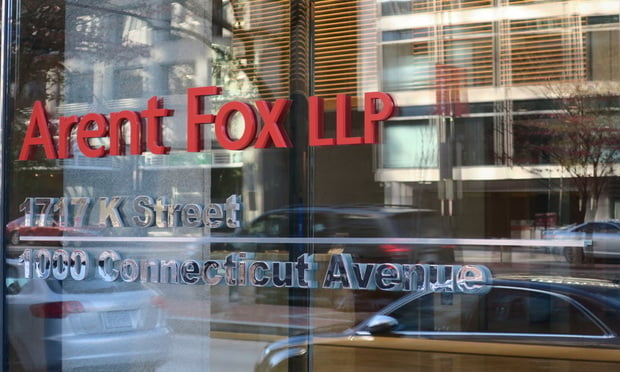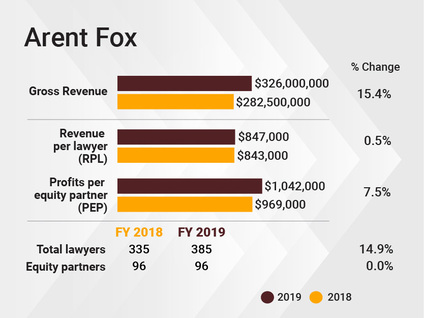A Spike in Revenue, Followed by Pay Cuts: Arent Fox Reflects the Industry's Turn
The firm's strong performance in 2019 had leaders eying new markets, including a presence in Chicago. Now it is cutting pay across the board.
April 07, 2020 at 01:06 PM
4 minute read
The original version of this story was published on National Law Journal
 Arent Fox office in Washington, D.C. (Photo: Michael A. Scarcella/ ALM)
Arent Fox office in Washington, D.C. (Photo: Michael A. Scarcella/ ALM)
Washington, D.C.-based Arent Fox grew its revenue by double digits while seeing a healthy boost in profits in 2019—the first full year of its combination with a smaller Boston firm.
Then the 2020 pandemic hit, shuttering about a quarter of the U.S. economy. Arent Fox, like many other firms, has made cost-cutting moves, such as 25% pay cuts for associates and staff and 60% reduction in equity partner distributions, according to Above the Law.
A firm spokesman said in a statement that in response to the economic slowdown, the firm made a "temporary pay cut for all attorneys, professionals, and staff."
The firm's leadership "recognizes that the biggest financial risk to a law firm is underreacting," the statement said. "Our goal is to put Arent Fox in a strong position so that we can continue to provide critical, first-rate service to our clients as we help them navigate" challenges from the crisis.
The firm's experience underlines how quickly the economic fallout of the pandemic has stricken the industry—even Am Law 200 firms with healthy profit margins. Arent Fox's profit margins dipped slightly in 2019 but were above 30%.
The firm's gross revenue shot up by 15.4% to $326 million in 2019, when its combination with 55-lawyer firm Posternak Blankstein & Lund became effective. The Posternak firm's legacy revenue was about $29 million, the firm said last month, while the combination generated an additional $3 million in work in the first year.
Revenue per lawyer, at $847,000, was flat amid a 15% increase in head count to 385 attorneys. Even with the head count bump, the firm's equity tier stayed flat at 96 partners, making profits per equity partner grow 7.5% to $1.042 million.
 In an interview on March 11—before quarantine orders and court shutdowns across the country—the firm's leaders sounded optimistic based on last year's performance. Chair Mark Katz said all the firm's departments outperformed the firm's budget in 2019. Managing partner Cristina Carvalho said the firm's Boston office immediately started working with firm as a whole, "and even though it was year one, there was a lot of collaboration."
In an interview on March 11—before quarantine orders and court shutdowns across the country—the firm's leaders sounded optimistic based on last year's performance. Chair Mark Katz said all the firm's departments outperformed the firm's budget in 2019. Managing partner Cristina Carvalho said the firm's Boston office immediately started working with firm as a whole, "and even though it was year one, there was a lot of collaboration."
The Posternak firm's bench of real estate translational and corporate lawyers, including venture capital and early company formation, was a "perfect match" for Arent Fox's regulatory expertise, Carvalho said.
One example of the client work the combined firm generated was working for a biotech company in Massachusetts, Tevard Biosciences. With Arent Fox's existing Food and Drug Administration expertise, the combined firm could also offer corporate advice from Boston, Carvalho said.
Among other matters last year, the firm's corporate department represented District Photo in Apollo's acquisition of Snapfish and its merger into Shutterfly, and its government contracts lawyers guided longtime client Unisys through a $1.2 billion sale of its Federal business to SAIC.
The Posternak merger exceeded the firms' projections in terms of hours billed and other measures, such as successful lateral recruitment, Katz said. The merger had gone so well that Arent Fox leaders were considering other locations. Last month, Katz expressed an interest in the Chicago market, noting it "it would be a logical step" to have a presence there.
But even last month, Katz acknowledged, "all the forward guidance we have is on hold at the moment." He added, "We put out a budget at the beginning of the year that we expect revenue to be X, and this year it's anyone's guess."
"The impact of the virus is going to hit everyone, so we just have to what 2020 is in store for us," Katz said.
Read More:
Midsize Merger Brings Arent Fox to Booming Boston
'Strong, Big-Name Firms' Are Looking at Imminent Cuts to Partner Draws, Consultant Says
This content has been archived. It is available through our partners, LexisNexis® and Bloomberg Law.
To view this content, please continue to their sites.
Not a Lexis Subscriber?
Subscribe Now
Not a Bloomberg Law Subscriber?
Subscribe Now
NOT FOR REPRINT
© 2025 ALM Global, LLC, All Rights Reserved. Request academic re-use from www.copyright.com. All other uses, submit a request to [email protected]. For more information visit Asset & Logo Licensing.
You Might Like
View All
Greenberg Traurig Litigation Co-Chair Returning After Three Years as US Attorney
3 minute read
Blank Rome Snags Two Labor and Employment Partners From Stevens & Lee
4 minute read
12-Partner Team 'Surprises' Atlanta Firm’s Leaders With Exit to Launch New Reed Smith Office
4 minute read
After Breakaway From FisherBroyles, Pierson Ferdinand Bills $75M in First Year
5 minute readLaw Firms Mentioned
Trending Stories
- 1Silk Road Founder Ross Ulbricht Has New York Sentence Commuted by Trump
- 2Settlement Allows Spouses of U.S. Citizens to Reopen Removal Proceedings
- 3CFPB Resolves Flurry of Enforcement Actions in Biden's Final Week
- 4Judge Orders SoCal Edison to Preserve Evidence Relating to Los Angeles Wildfires
- 5Legal Community Luminaries Honored at New York State Bar Association’s Annual Meeting
Who Got The Work
J. Brugh Lower of Gibbons has entered an appearance for industrial equipment supplier Devco Corporation in a pending trademark infringement lawsuit. The suit, accusing the defendant of selling knock-off Graco products, was filed Dec. 18 in New Jersey District Court by Rivkin Radler on behalf of Graco Inc. and Graco Minnesota. The case, assigned to U.S. District Judge Zahid N. Quraishi, is 3:24-cv-11294, Graco Inc. et al v. Devco Corporation.
Who Got The Work
Rebecca Maller-Stein and Kent A. Yalowitz of Arnold & Porter Kaye Scholer have entered their appearances for Hanaco Venture Capital and its executives, Lior Prosor and David Frankel, in a pending securities lawsuit. The action, filed on Dec. 24 in New York Southern District Court by Zell, Aron & Co. on behalf of Goldeneye Advisors, accuses the defendants of negligently and fraudulently managing the plaintiff's $1 million investment. The case, assigned to U.S. District Judge Vernon S. Broderick, is 1:24-cv-09918, Goldeneye Advisors, LLC v. Hanaco Venture Capital, Ltd. et al.
Who Got The Work
Attorneys from A&O Shearman has stepped in as defense counsel for Toronto-Dominion Bank and other defendants in a pending securities class action. The suit, filed Dec. 11 in New York Southern District Court by Bleichmar Fonti & Auld, accuses the defendants of concealing the bank's 'pervasive' deficiencies in regards to its compliance with the Bank Secrecy Act and the quality of its anti-money laundering controls. The case, assigned to U.S. District Judge Arun Subramanian, is 1:24-cv-09445, Gonzalez v. The Toronto-Dominion Bank et al.
Who Got The Work
Crown Castle International, a Pennsylvania company providing shared communications infrastructure, has turned to Luke D. Wolf of Gordon Rees Scully Mansukhani to fend off a pending breach-of-contract lawsuit. The court action, filed Nov. 25 in Michigan Eastern District Court by Hooper Hathaway PC on behalf of The Town Residences LLC, accuses Crown Castle of failing to transfer approximately $30,000 in utility payments from T-Mobile in breach of a roof-top lease and assignment agreement. The case, assigned to U.S. District Judge Susan K. Declercq, is 2:24-cv-13131, The Town Residences LLC v. T-Mobile US, Inc. et al.
Who Got The Work
Wilfred P. Coronato and Daniel M. Schwartz of McCarter & English have stepped in as defense counsel to Electrolux Home Products Inc. in a pending product liability lawsuit. The court action, filed Nov. 26 in New York Eastern District Court by Poulos Lopiccolo PC and Nagel Rice LLP on behalf of David Stern, alleges that the defendant's refrigerators’ drawers and shelving repeatedly break and fall apart within months after purchase. The case, assigned to U.S. District Judge Joan M. Azrack, is 2:24-cv-08204, Stern v. Electrolux Home Products, Inc.
Featured Firms
Law Offices of Gary Martin Hays & Associates, P.C.
(470) 294-1674
Law Offices of Mark E. Salomone
(857) 444-6468
Smith & Hassler
(713) 739-1250









